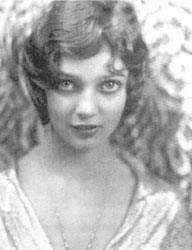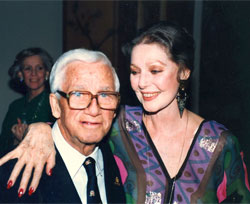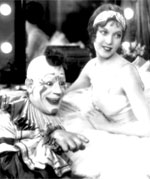 One day director Mervyn LeRoy phoned the house, looking for Polly Ann. Gretch answered the call. "She's not here," she informed him. "She's on location, doubling for Dolores Costello." Polly Ann also "doubled" frequently for Joan Crawford, doing anything that was too dangerous for the star to do.
One day director Mervyn LeRoy phoned the house, looking for Polly Ann. Gretch answered the call. "She's not here," she informed him. "She's on location, doubling for Dolores Costello." Polly Ann also "doubled" frequently for Joan Crawford, doing anything that was too dangerous for the star to do.
"Too bad," Leroy said. "There's a nice little part for her in a picture Colleen Moore is doing, Naughty But Nice. But we need her tomorrow."
Gretch's heart leaped. "W-would I do?" she asked.
LeRoy laughed. "I don't know. Who are you, and what do you look like?"
"I'm Polly's sister, Gretchen, and I guess I'm not bad looking...."
"Fine. Stop by any time today and we'll talk about it."
Today? First National Studios was at least three streetcar rides away, and she had never traveled there by herself.
"I can't go with you today, dear," Gladys informed her excited daughter. "But if you want to be in movies, you'll have to learn to get around by yourself.
Mervyn LeRoy was not only a top director, but a prominent and respected member of Hollywood society. When he immediately cast Gretch in the part, it validated her as someone with possibilities.
 Colleen Moore, the star of Naughty But Nice, was also enchanted with Gretch. Colleen had noticed her among the child extras on a previous set, and prevailed upon the studio to give the young girl a screen test. Gretch photographed beautifully, and the studio decided to put her under contract.
Colleen Moore, the star of Naughty But Nice, was also enchanted with Gretch. Colleen had noticed her among the child extras on a previous set, and prevailed upon the studio to give the young girl a screen test. Gretch photographed beautifully, and the studio decided to put her under contract.
Mervyn LeRoy has been credited with changing Gretch' name, but Colleen Moore also had a hand in it. Everyone agreed that "Gretchen" was not an "actress' name", but Leroy had always said that he selected "Loretta" - because it would look better on a theater marquee.
Colleen claimed that "Laurita" was her first choice, but because it sounded so foreign, "Loretta" became the compromise. Whatever the truth, Gretch learned of her name change by reading it in the newspaper a few weeks later. "It took me years to learn to like it," She admitted later in life.
 During that first year, Loretta learned far more about the "picture business" than simply how to act in front of the camera. One morning she missed one of her streetcars, and arrived at the studio an hour late. "I dashed onto the set, but the director, George FitzMorris, called me up in front of everyone".
During that first year, Loretta learned far more about the "picture business" than simply how to act in front of the camera. One morning she missed one of her streetcars, and arrived at the studio an hour late. "I dashed onto the set, but the director, George FitzMorris, called me up in front of everyone".
"I want to tell you something, young lady," he snarled. "Don't you ever, ever, EVER be late again, on my set or anyone else's! You were supposed to stand right behind Miss Moore in that scene, and we couldn't shoot her close-up without you. You have kept this entire set waiting. That's inexcusable!"
Loretta felt the tears gathering.
"No crying!" FitzMorris commanded. "Just remember what I said!"
 Despite her immaturity, and transportation problems, she finally received her big break when she was 'loaned out' to Metro Goldwyn Mayer to test for the leading role opposite Lon Chaney in Laugh Clown Laugh. In spite of her thin, as yet undeveloped figure, her beauty was becoming apparent. Her luminous gray-blue eyes, radiant skin and high cheekbones won her the role of the tightrope walker over sixty other girls.
Despite her immaturity, and transportation problems, she finally received her big break when she was 'loaned out' to Metro Goldwyn Mayer to test for the leading role opposite Lon Chaney in Laugh Clown Laugh. In spite of her thin, as yet undeveloped figure, her beauty was becoming apparent. Her luminous gray-blue eyes, radiant skin and high cheekbones won her the role of the tightrope walker over sixty other girls.
Later, Loretta described herself in that role as; "A screenful of big eyes and buck teeth!"
The director, Herbert Brenon, was rumored to be hard to please. That turned out to be a real understatement. Loretta, now fourteen, had never experienced treatment like his.
"It started right away," she recalled. "He criticized me in front of everyone, told me I was stupid and useless." Brenon mocked her acting and kept threatening to fire her, if she could not do the job the way he wanted. Often, after his tirades, Loretta left the set in tears.
Loretta's costar had noticed her difficulties. Lon Chaney, already famous as the "Man of 1,000 Faces" for using elaborate makeup to portray characters as varied as the Hunchback of Notre Dame and the Phantom of the Opera, was a kind man, and extremely popular. He intervened on Loretta's behalf.
"If it were not for his compassion, I would not have continued in the motion picture business," Loretta said. Chaney, apparently, had a few private words with Brenon, and from then on the situation changed. Brenon ceased his abuse and the movie stayed on schedule.
"He indeed saved my career, but he also taught me how cope with a difficult personality without getting an ulcer or nervous breakdown," she remembered. "I shall be beholden to that sensitive, sweet man until I die."
Next: Becoming Loretta
Excerpts © copyright 2000 Joan Wester Anderson. All rights reserved.